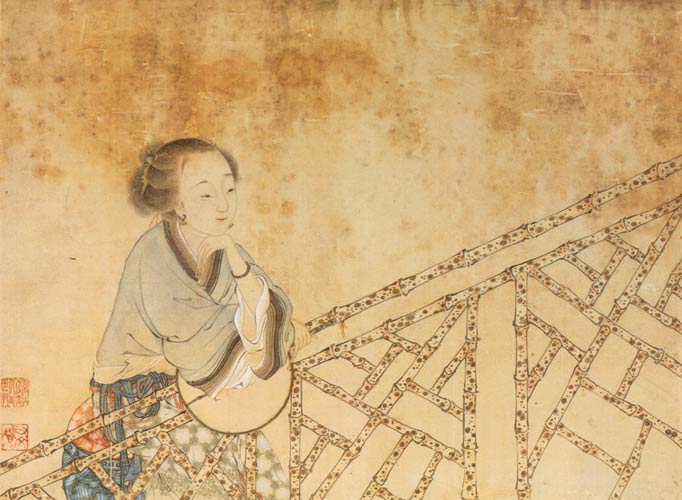

Painting by Ju Qing, a 19th Century artist, of a beautiful lady with a fan, contemplating life quietly, looking out over the bamboo railing. The story behind this tranquil composition was described by the authors of Views from Jade Terrace (1988 Indianapolis Museum of Art):
The bamboo railing is known as leizhu or banzhu (weeping, or speckled bamboo). It is said that the legendary Emperor Shun took an expedition to the southern part of China, accompanied by his two concubines, the daughters of Emperor Yao. Unfortunately, Emperor Shun died near Cangwu. The tears of the mourning concubines fell onto the bamboo and permanently stained the plant's stalk. In the painting, each spot on the speckled bamboo was meticulously executed…
The weeping bamboo portrays the sadness that often accompanies life; the woman portrays the triumph over it as we gain understanding. The famous Taoist Chuang-tse (Chuangzi) commented:
Joy and anger, sorrow and happiness, worries and regrets, indecision and fears come upon us by turns, with ever-changing moods, like music from the hollows, or like mushrooms from the damp. Day and night they alternate within us, but we cannot tell whence they spring. Alas! Alas! could we for a moment lay our finger upon the very cause?
But for these emotions, I should not be. Yet, but for me, there would be no one to feel them. So far we can go; but we do not know by whose order they come into play. It would seem there was a soul, but the clue to its existence is wanting. That it functions is credible enough, though we cannot see its form. Perhaps it has inner reality without outward form.
Take the human body with all its hundred bones, nine external cavities, and six internal organs, all complete. Which part of it should I love best? Do you not cherish all equally, or have you a preference? Do these organs serve as servants of someone else? Since servants can not govern themselves, do they serve as master and servants in turn? Surely there is some soul which controls them all.
But, whether or not we ascertain what is the true nature of this soul, it matters but little to the soul itself. For once coming into this material shape, it runs it course until it is exhausted. To be harassed by the wear and tear of life, and to be driven along without possibility of arresting one's course-is not this pitiful indeed? To labor without cease all life, and then, without living to enjoy the fruit, worn out with labor, to depart, one knows not whither-is not this just cause for grief
?